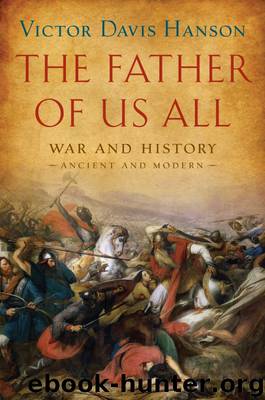The Father of Us All: War and History, Ancient and Modern by Victor Davis Hanson

Author:Victor Davis Hanson [Hanson, Victor Davis]
Language: eng
Format: epub, mobi
Tags: General, History, Military, Military History, Civilization, War
ISBN: 9781608194100
Publisher: Bloomsbury USA
Published: 2011-04-26T00:00:00+00:00
Why We Fight as We Do
WHAT, THEN, IS the American way of war? Without a national religion or a common race or ethnic culture, Americans are united first by shared ideas and commitments, such as the ideals of equal opportunity and individual merit, as well as the history and legends that give these ideas concrete meaning. Our military functions more as a reflection of our national meritocracy, where wealth and breeding, or tribal affiliations and favoritism, do not necessarily guarantee rank, privilege, and promotion.
In theory, this allowed that a gifted but shabby-looking general like Ulysses S. Grant—a failure in both earlier civilian and military life—could more successfully lead the Army of the Potomac than the aristocratic ex-railroad president George McClellan. We admire the uncouth George Patton for his often crude genius, despite, not because of, his aristocratic roots—in the same manner that the plebian background of Omar Bradley and Dwight Eisenhower often seemed to work to their advantage by suggesting both were self-made men who had advanced without wealth or social connections, and they therefore easily resonated with the American public and press. This reliance on presumed merit rather than class has sometimes given American armies singular commanders who were swashbuckling and unseemly—an unlettered Nathan Bedford Forrest, a shabbily dressed William Tecumseh Sherman, a cigar-chomping Curtis LeMay—and who might otherwise have found little opportunity in more aristocratic or tribal militaries.
Second, the frontier experience on such a vast continent made Americans by needs conquer time and space, explaining why European inventions in transportation and communication came into their own in America on a scale undreamed of elsewhere—railroads, steam engines, the telegraph and telephone, and electric power. America’s role as a “receptacle of the unwanted”—an arena where audacious individuals, fleeing from poverty or discrimination, were in a hurry to start over and succeed rapidly—only added to the restless fascination with machines that were so disruptive of the traditions and tranquility of the past. Mechanization was equated with a culture of youth, restless and eager to go places, the more distant and more quickly, the better.
To meet General John Pershing’s promise of getting “a million men” to France before the end of the war—in truth, forty-eight divisions of 28,000 men made it to Europe by the 1918 armistice, or over 1,200,000 combat troops—Americans overnight reorganized their rail systems, built and commandeered hundreds of ships (building more tonnage in April 1918 than America had in all at 1914), and managed to implement a draft that sent hundreds of thousands from farms in the heartland to France without losing a single recruit to German submarines or surface raiders on the routes over. The Army of the Potomac and the Union navy started off with flintlocks and wooden sailing ships and fought a mere four years later with dreadful new weapons, such as repeating rifles (lever-action Spencers spitting seven shots in twelve seconds), Gatling guns (two hundred shots per minute), and ironclad warships with eleven-inch guns. There was rarely an American version of a Spartan king,
Download
The Father of Us All: War and History, Ancient and Modern by Victor Davis Hanson.mobi
This site does not store any files on its server. We only index and link to content provided by other sites. Please contact the content providers to delete copyright contents if any and email us, we'll remove relevant links or contents immediately.
| Africa | Americas |
| Arctic & Antarctica | Asia |
| Australia & Oceania | Europe |
| Middle East | Russia |
| United States | World |
| Ancient Civilizations | Military |
| Historical Study & Educational Resources |
Cecilia; Or, Memoirs of an Heiress — Volume 1 by Fanny Burney(32558)
Cecilia; Or, Memoirs of an Heiress — Volume 2 by Fanny Burney(31956)
Cecilia; Or, Memoirs of an Heiress — Volume 3 by Fanny Burney(31941)
The Secret History by Donna Tartt(19088)
Sapiens: A Brief History of Humankind by Yuval Noah Harari(14389)
Leonardo da Vinci by Walter Isaacson(13336)
The Radium Girls by Kate Moore(12028)
Sapiens by Yuval Noah Harari(5370)
How Democracies Die by Steven Levitsky & Daniel Ziblatt(5218)
The Wind in My Hair by Masih Alinejad(5095)
Homo Deus: A Brief History of Tomorrow by Yuval Noah Harari(4918)
Endurance: Shackleton's Incredible Voyage by Alfred Lansing(4782)
Man's Search for Meaning by Viktor Frankl(4606)
The Silk Roads by Peter Frankopan(4534)
Millionaire: The Philanderer, Gambler, and Duelist Who Invented Modern Finance by Janet Gleeson(4478)
The Rape of Nanking by Iris Chang(4211)
Joan of Arc by Mary Gordon(4110)
The Motorcycle Diaries by Ernesto Che Guevara(4098)
Stalin by Stephen Kotkin(3965)
